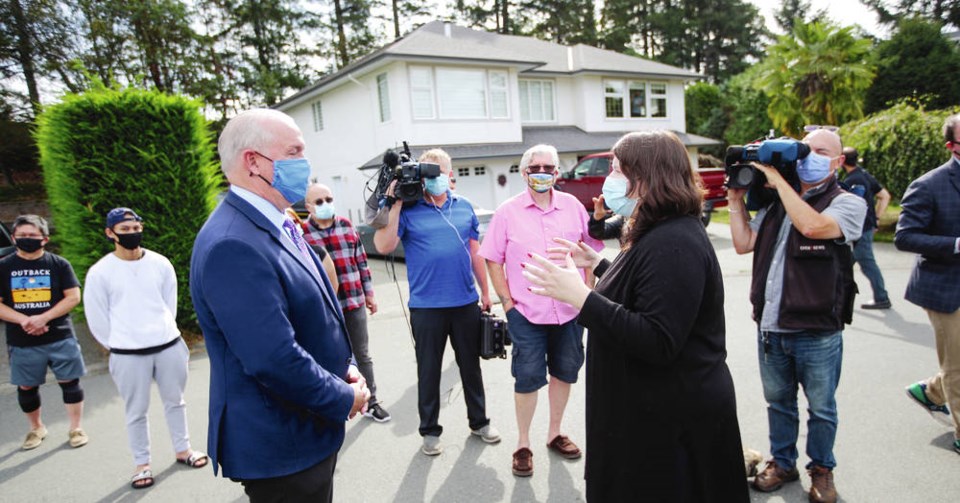British Columbians will go to the polls on Oct. 24 to choose the provincial government that will lead them through the COVID-19 pandemic and the next four years.
Lt.-Gov. Janet Austin met with NDP Premier John Horgan Monday morning and granted his request to dissolve the legislature and hold a general election.
Horgan told a news conference from his home riding of Langford-Juan de Fuca that he struggled “mightily” with whether to call an election in the midst of a pandemic and one year before the fixed election date in October 2021.
But he ultimately felt an election was necessary to ensure that British Columbians have a stable government to deal with the challenges ahead, he said.
“We are far from out of the woods. We are not at the end of COVID-19, we’re at the beginning. This pandemic will be with us for a year or more.
“And that’s why I believe we need to have an election now. We can either delay that decision and create uncertainty and instability over the next 12 months — more speculation, more talk about what might be. Or we can do what I believe is always the right thing and ask British Columbians what they think.”
Liberal Leader Andrew Wilkinson criticized Horgan and the NDP for trying to secure their own employment instead of working for ordinary British Columbians.
“Right now, it’s hard to find anybody of the five million people in British Columbia who are saying. ‘Oh great, let’s have a general election!’, because they say we need stability,” he said. “We do not need the cynical, self-serving, selfish move by the NDP to trigger an election right now. We need to worry about the health of our families, about the school system, about employment, about whether or not we’ve got a job by Christmas time.”
Newly-elected B.C. Green Party Leader Sonia Furstenau, whose party propped up the NDP minority government for the past three years, called the election “completely unnecessary.” She told reporters that she met with Horgan on Friday and assured him that he had a stable government backed by her and Green MLA Adam Olsen.
“This is not a time when we put the interest of a political party ahead of the British Columbians who need to know that we are here to serve them,” she said. “I am disappointed that this is what John Horgan has chosen to do, and I fully intend to hold him accountable for this decision.”
Horgan, however, said the partnership with the Greens has changed with the departure of Andrew Weaver as Green leader. He left the party to sit as an Independent and does not plan to run again in Oak Bay-Gordon Head.
“The stability that I believe we had over the course of our minority government is not as strong as it was when we began,” Horgan said, pointing to difficulties the government had passing two pieces of legislation this past summer.
“The challenges of partisanship within the legislature will always be there, but particularly this summer, it was clear to me that there is a great divide between the two sides.”
The election call comes with Horgan and the NDP riding high in public opinion polls and some have accused Horgan of political opportunism.
But Camosun College political science instructor Daniel Reeve said that’s a “two-sided coin.”
“The Opposition is down so they’re going to scream bloody murder,” he said. “The government’s up so they’re going to be opportunistic. I don’t think you can honestly look at that situation and say would the Liberals or the Greens have done any differently. I mean, politics in a minority government situation is about getting a majority and I think any of those parties would have done it.”
Reeve acknowledged that Horgan is taking a risk by calling an election amidst a pandemic.
“But I also think that this isn’t like March,” he said. “In March, you could drive down the street and there’d not be a single car. I think there’s kind of a new normal being established and I think he’s kind of banking on that.
“I think he’ll make the argument somewhere, if he hasn’t already, that if you can open up restaurants and you can open up businesses, if Elections B.C. does their job right, you can certainly do an election.”
New Brunswick’s Progressive Conservatives took a similar risk in calling a snap election and won a majority government this month. Saskatchewan voters will go to the polls Oct. 26 — two days after the B.C. election.
Horgan said Finance Minister Carole James, who is not running again in Victoria-Beacon Hill, will serve as a caretaker minister during the election and work with the public service to handle any issues that arise.



